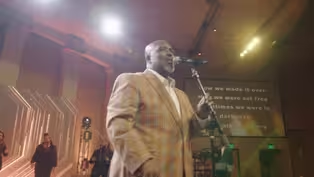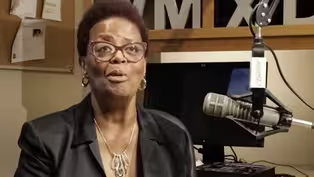
The Black church’s role in fostering gospel music in Detroit
Clip: Season 52 Episode 7 | 8m 11sVideo has Closed Captions
Greater Grace Temple Senior Pastor Bishop Charles Ellis III on Detroit’s gospel history.
In conjunction with PBS' "GOSPEL" docuseries, Bishop Charles Ellis III talks with “Detroit Performs” host Satori Shakoor and BridgeDetroit journalist Orlando Bailey about the history of Greater Grace Temple, the legacy of his late father, the whooping tradition among African American preachers, and his hopes for the future of gospel music in Detroit. Plus, a performance of his song “Done For Me.”
Problems playing video? | Closed Captioning Feedback
Problems playing video? | Closed Captioning Feedback
American Black Journal is a local public television program presented by Detroit PBS

The Black church’s role in fostering gospel music in Detroit
Clip: Season 52 Episode 7 | 8m 11sVideo has Closed Captions
In conjunction with PBS' "GOSPEL" docuseries, Bishop Charles Ellis III talks with “Detroit Performs” host Satori Shakoor and BridgeDetroit journalist Orlando Bailey about the history of Greater Grace Temple, the legacy of his late father, the whooping tradition among African American preachers, and his hopes for the future of gospel music in Detroit. Plus, a performance of his song “Done For Me.”
Problems playing video? | Closed Captioning Feedback
How to Watch American Black Journal
American Black Journal is available to stream on pbs.org and the free PBS App, available on iPhone, Apple TV, Android TV, Android smartphones, Amazon Fire TV, Amazon Fire Tablet, Roku, Samsung Smart TV, and Vizio.
Providing Support for PBS.org
Learn Moreabout PBS online sponsorship- Satori and Orlando also spoke with a member of American Black Journal's Black Church in Detroit Advisory Panel, Bishop Charles Ellis III of Greater Grace Temple.
Here's some of that conversation, along with a clip of Bishop Ellis singing an original song, titled "Done For Me."
- Of course, we cannot talk to you and talk about Greater Grace without talking about the visionary that is your father, Bishop David Ellis.
Talk about what your dad built, started, and what it means to you to carry it on.
- Well, Greater Grace is almost 100 years in 2027.
I only had three pastors.
One for 35 years, Bishop Forbes, who started it in his home, and then my dad pastored for 34 years.
And now, I'm coming up on 28 years now, in this coming March.
So that's a blessing just to have consistency in leadership.
You know, there's some ministries that have to get used to new leadership.
And when new leadership comes in, changes come.
So it's a blessing that almost in 100 years, this church has had three pastors, and it's almost evenly split, 30 something years, 30 something years.
And hopefully, the Lord will allow me to serve for 30 something years.
And I'm just honored to be here.
But my dad, he was the builder of the church.
- Yeah.
- Those 34 years, that was when the church went from like 60 members to like 2,000 members.
And we built the cathedral onto the synagogue down on seven mile and Schaefer where Bishop Sheard is now.
So, my dad was a great, he was a great man, charismatic man, loved people.
- Singer.
- He wasn't just a preacher.
I'm getting ready to say, this is all about music, and gospel music in Detroit.
He was a singer.
He actually recorded twice.
He recorded with Ty Scott Records, and he recorded with our church.
And those songs are still played today, "Joy Bells."
- "Joy Bells."
- And "Down Through The Years."
- That's it.
- Absolutely.
(Orlando laughs) And thank God for YouTube, you know what I'm saying?
- Yeah, yeah, because the legacy lives on.
- Absolutely.
- Yes, absolutely.
- Never dies.
- Never dies.
- And how did gospel music change over those, over that 100 year period, 30, 30, 30 years?
- Well, all you have to do is if you would have interviewed Edwin Hawkins and Walter Hawkins, they would say, "We almost got put out the church."
And we wasn't foot stepping and sliding and dipping and all of that.
We were just saying, "Oh, happy day.
Oh, happy day."
And hey, and had the nerve to put Jesus's name in it.
- Jesus washed, straight.
- Now people always say, "Well, they don't mention Jesus enough."
You know, they had, when Jesus washed all my sins away and almost got put out of the church.
So we've seen gospel music come a long ways.
Now, you have gospel artists recording with secular artists.
You know, you have Snoop Dogg now, recording.
He's got what, Fred Hammond, the Clark Sisters, and Bishop Ransay Alain, God bless his memory, you know, recorded with him.
And the Hawkins probably said, "Somebody owes us an apology."
- Do you feel like each generation sort of has that, like those champions, right, to help modernize it?
I remember coming up, Kirk Franklin was not to be played, at the church house.
And I was coming up in the '90s, but I would remember, it was like, you know, the Clark Sisters and the Winans, you know, all these folks who helped modernize and help gospel music sort of crossover, were at one point, really controversial figures.
- Without a doubt.
You know, the Clark Sisters, you know, they were always gospel until Twinkie wrote, "You Brought the Sunshine" and put that Stevie Wonder kick.
♪ Da-doom, da-doom, da-doom Hey, that sound like that blind boy to be, Stevie Wonder.
You can't play that in church.
And you think about those trendsetters, you know, and certainly, probably goes way back before that, Thomas Dorsey and a lot of others, you know, when you think of Louis Armstrong singing, "Oh, When the Saints Come Marching In," you know, with that Louisiana ragtime type of presentation, you know, somebody has always had to push the envelope, you know, to get us where we are.
- We all have souls.
- Absolutely, absolutely.
- And the music reaches, it's magic.
- I always think about Aretha Franklin's father, the Reverend C.L.
Franklin, one of the greatest prolific, you know, hoopers and preachers in the church world.
- Absolutely.
- And when he says that- - Who's a hooper?
- A hooper is one that gets in gear with an organ behind him.
- That's it.
♪ When When the preacher goes into music.
- You can say, ♪ Every now and then or you can say.
♪ Every now and then - Oh, come on.
- Go ahead, bishop.
- And then you step back, and then the organ's like.
♪ Dun, dun, dun, dun ♪ The Lord will come Yeah, but he said, when the lady at the cleaner said- - He's got it, Bishop Ellis, you forgot about us.
Okay, okay, okay.
- You taught us.
- I'm sorry.
- No, but I love his statement, when the lady at the cleaner says, "You know, yeah, I saw your daughter on TV, the Ed Sullivan show, but I'll be glad when she comes back to the church."
And he said, "Let me tell you something.
Aretha ain't never left the church."
- She come home.
- And I love those statements, because God blesses us sometimes to go into spaces where everybody can't go.
- My last question for you is about the enduring legacy of gospel music, and especially, here in the city of Detroit and what you hope for it to become.
- I would hope that Detroit would continue to be a beacon of gospel music in this industry and in this time.
I know LA is gonna, they're gonna claim theirs and Chicago's gonna claim its, and Atlanta's gonna claim its, but before Atlanta became a black Mecca, a capital, you know, Atlanta, Detroit was the place.
If Detroit had more community choirs and church choirs, that really had the sound and had the quality to perform nationally, and as we call it on wax, on albums, but just never did.
But shoot, that's why it was hard to get a paid concert in Detroit at the Ford Auditorium, because you can go to any church on a Sunday, and hear a church choir rocking a house, no if, ands, and buts about it.
So I would hope that one of the legacies would be, you know, whenever you talk about gospel music, Detroit always comes up.
♪ What he's done for me ♪ What he's done for me ♪ I just got to tell you what the Lord has done for me ♪ ♪ He loosed my shackles, and he set me free ♪ ♪ I just got to tell you what the Lord has done for me ♪ Help me choir.
♪ What he's done for me ♪ What he's done for me ♪ What he's done for me ♪ I just got to tell you ♪ I just got to tell you ♪ What the Lord has done ♪ What the Lord has done for me ♪ ♪ Loosed my shackles ♪ And he loosed my shackles ♪ Set me free ♪ And he set me free ♪ I just got to tell you ♪ I just got to tell you ♪ What the Lord has done ♪ What the Lord has done for me ♪ Let me tell you what it is.
♪ When sin had me out ♪ Jesus took me in ♪ When I felt all alone ♪ He became my best friend ♪ And now he's right here with me ♪ ♪ Through the thick and the thin ♪ ♪ And I just got to tell you ♪ What the lord has done for me ♪ ♪ He lifted me up ♪ When I was feeling low ♪ And I heard them doorbells ♪ Ringing down in my soul ♪ I just wanna tell everybody ♪ And whole world wide to know ♪ I just got to tell you what the Lord has done for me ♪ I brought Paul Porter to sing this.
Talk to me, Paul.
- Yes sir.
♪ He brought me out at Monterey Clay ♪ ♪ And he set my feet on side of the road to stay ♪ ♪ And he put a song in my soul today ♪ ♪ And I just got to tell you ♪ What the Lord had done for me ♪ ♪ Oh, oh, oh, oh ♪ What's he's done for me ♪ Oh, what he's done for me ♪ I just got to tell you ♪ I just got to tell you
Darius Twyman discusses Detroit’s influence on gospel music
Video has Closed Captions
Clip: S52 Ep7 | 8m 56s | Darius Twyman discusses Detroit’s influence on gospel music and Black spirituality. (8m 56s)
Origins, evolution of gospel with Dr. Deborah Smith Pollard
Video has Closed Captions
Clip: S52 Ep7 | 5m 14s | Origins, evolution of gospel with Dr. Deborah Smith Pollard (5m 14s)
Providing Support for PBS.org
Learn Moreabout PBS online sponsorship
- News and Public Affairs

Top journalists deliver compelling original analysis of the hour's headlines.

- News and Public Affairs

FRONTLINE is investigative journalism that questions, explains and changes our world.












Support for PBS provided by:
American Black Journal is a local public television program presented by Detroit PBS

